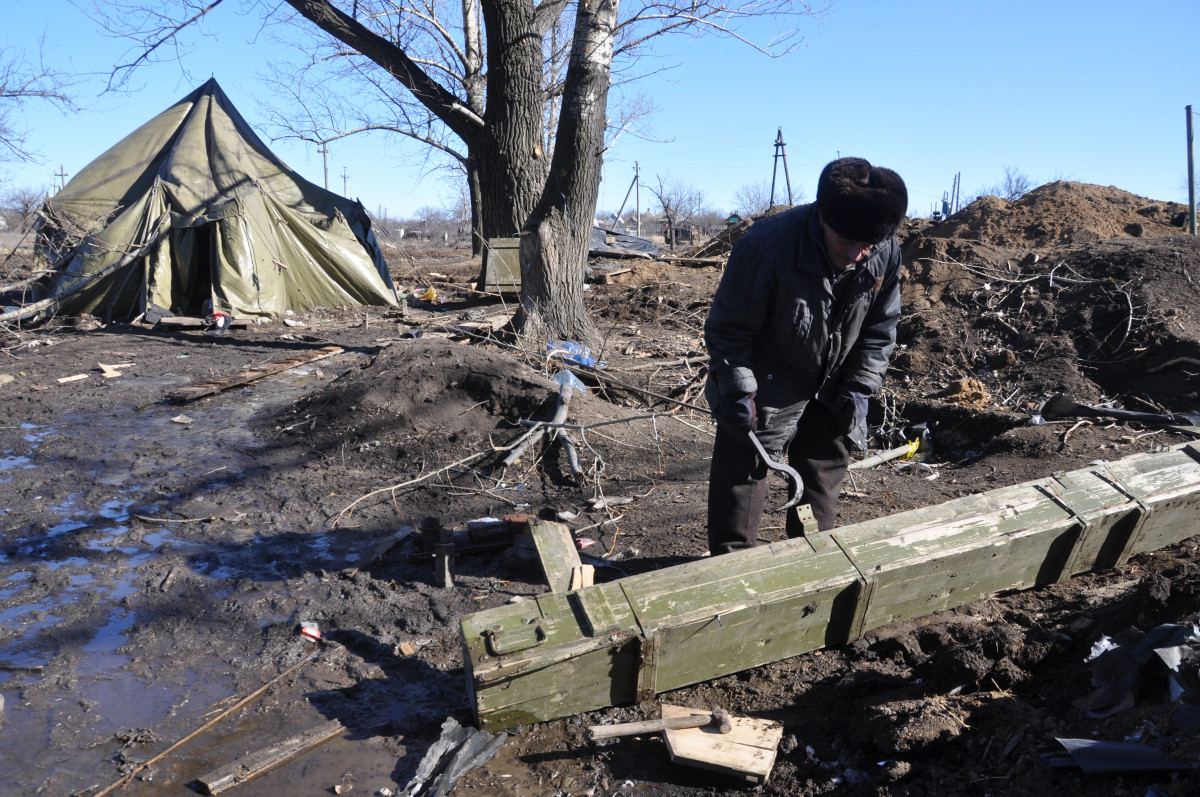We have delivered aid to the war-torn town of Debaltseve
Published: Feb 25, 2015 Reading time: 4 minutes Share: Share an article“This won’t work.” We stop abruptly in front of a damaged bridge, around 20km left of our target destination. The road ahead has collapsed, and is sunken about a meter and a half. Someone before us drove too fast, and his car now hangs from the bridge. It is clear that we will have to take a detour. After some exploration, we find an empty field and we push through the mud, hoping that our car won’t run into some forgotten landmine.

The town of Uglegorsk is marked by a destroyed tank that was left by the Ukrainian army – this sight will haunt us until we pass this grim memento again on our return trip. The road is covered in shrapnel and debris, trees are torn apart by grenades, and almost every house is either riddled by bullet holes or burnt down. The next town over is Debaltseve. Reviewing our documents at the checkpoint takes a long time, but we are finally free to go. The fighting stopped a few days ago and people have started to appear in the streets. Are they experiencing hope? There certainly is some, because otherwise places like this are deserted when the situation becomes critical.
#~gallery-934~#
Not everyone has the courage to walk the streets again. The bomb shelter “East” is characterized by the extreme cold and damp. There is no heating because the electricity has been off for weeks. Yet some local residents still stay. “Why am I still here when the fighting is over?” Maxim, who has been living underground since the start of the bombardment of Debaltseve in August explains: “My house is destroyed. I do not have anywhere to go, and I know this place.”
Sisters Natasha (8) and Anja (11) feel similarly. They attended school until January. Then, due to violence, they were forced to spend a horrifying three weeks non-stop in the underground shelter. One of the rockets is still stuck in the ground near the bunker, and local people have to watch the children, who naturally like to play with such things.
“Have you done your military service? I did!” replies grandpa Michail, when asked if he is afraid to walk around the destroyed tanks in a former military camp. Military engineers have not yet cleared the area, and unexploded ammunition is a common sight. This matters little to Michail, who walks through the camps mostly out of desperation – he tries to break apart the grenade boxes with a little axe to make planks to fix his roof. “I have to cover the shrapnel holes,” he says proudly and adds that he won’t wait for any humanitarian workers.
It is essential that we react quickly – thousands of meters of roofing materials and tons of glass, planks, and beams are needed to repair the many damaged houses. Local administration and humanitarian NGOs have already solved the food shortage problem, and there are enough supplies for the next two weeks. But other services are still needed. “The pasta or rice is useless when there is no way to cook it,” explains Sergei. A few meters away, his neighbours are trying to heat the food on a campfire. “The wood is damp, it does not burn,” they complain.
In response, People in Need brought a five ton lorry full of much needed aid. The car came in a convoy in conjunction with Doctors without Borders. Thanks to the Czech Ministry of Foreign Affairs, People in Need was able to provide plastic foil to cover the broken windows. UNHCR arranged that blankets, towels, sleeping bags, jerrycans, warm underwear, winter jackets and tarpaulins would cover the roofs. The World Food Programme (WFP) provided 92 monthly food rations that contained canned meat, rice, tea, canned tomatoes and other essential foodstuffs.
This delivery is only the first wave of aid - more will come. Future assistance will include food and sleeping bags, but will also feature more building materials to repair houses. While Debaltseve is the current focus of humanitarian attention, this frenzy will pass in the next few weeks, leaving the people and their deep troubles to remain.
People in Need in Ukraine
People in Need has helped to aid eastern Ukraine since August, organizing assistance from the Slavyansk office. We provide those most in need with immediate humanitarian aid, such as food or medicine. We also help repair damaged houses, equip refugee centers, and offer food vouchers to those who need them. Since the beginning of November, People in Need has been systematically working in Donetsk and areas controlled by separatists. PIN has opened an office in the city and provides the most vulnerable people with food, medicine, toiletries, and baby diapers. On a monthly basis, we provide food to over 7,000 people. Other aid includes the support of several retirement homes, hospices, and shelters for the homeless.
For more information, please contact:
Vladislav Vik, PIN desk officer for Ukraine, +420 778 531 399, Vladislav.Vik@clovekvtisni.cz
